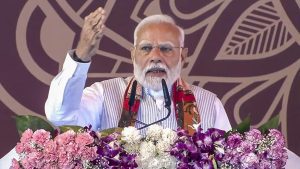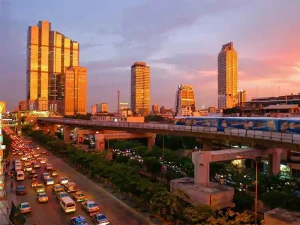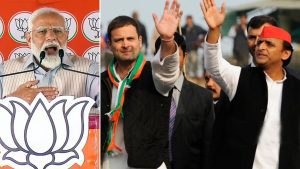Varanasi, Uttar Pradesh – Prime Minister Narendra Modi launched a scathing attack on opposition parties over the issue of dynastic politics during his visit to his parliamentary constituency Varanasi on Friday. While inaugurating and laying foundation stones for development projects worth more than ₹3,880 crore, Modi contrasted his government’s commitment to inclusive growth with what he characterized as the opposition’s focus on family-centric power politics. PM Modi’s bold statement on opposition parties set the tone for his address to supporters gathered at the rally.
“Our mantra for serving the nation has always been- sabka saath, sabka vikas (together with all, development for all),” Modi stated during his address at the rally. “We carry the spirit of compassion towards the people and commitment to the welfare and growth of all. Then there are people who are always playing games for snatching and grabbing power. Their guiding principle is – parivar ka saath, parivar ka vikas (work for gains and well-being of family).”
Although in the PM Modi’s bold statement on opposition, the Prime Minister did not explicitly name any political party, his remarks appeared to be directed at regional rivals such as the Samajwadi Party and the Congress, both of which have been criticized for promoting family members in leadership positions. Analysts note that PM Modi’s bold statement on opposition reflected his continuing strategy of positioning his government against dynastic political entities.

Development Projects Take Center Stage Amid Political Messaging
The Prime Minister’s visit to Varanasi, the constituency he has represented for three consecutive terms in Parliament, was marked by the inauguration of multiple development initiatives designed to enhance infrastructure, healthcare, and economic opportunities in the region. While these projects formed the core of his visit, PM Modi’s bold statement on opposition parties underscored the political dimension of the event.
Modi highlighted the significant transformation that Varanasi has undergone during the past decade, particularly noting the district’s emergence as a premier healthcare center in the Purvanchal region of Uttar Pradesh. “In the last few years, UP has changed its outlook and economic roadmap. UP is now not merely a land of possibilities but is fast becoming the land of competence and accomplishments,” he remarked.
The Prime Minister also emphasized the growing international recognition of local products, with several receiving geographical indicator (GI) tags. “This is not just a tag but proof of the region’s unique identity. It shows the product originates from this region,” Modi explained, underscoring the importance of these designations for promoting regional economic development and cultural heritage.
PM Modi’s Bold Statement on Opposition Reflects Ongoing Political Narrative
Since first representing Varanasi in Parliament in 2014, Prime Minister Modi has consistently emphasized the dual focus of preserving the city’s ancient cultural heritage while promoting modern development. This approach has been evident in projects ranging from the Kashi Vishwanath Corridor to infrastructure improvements and healthcare facilities.
Political observers note that PM Modi’s bold statement on opposition during Friday’s rally continues a pattern of contrasting his governance model with that of his political rivals. By framing opposition parties as focused on family advancement rather than public welfare, Modi reinforces a narrative that has resonated with many voters in previous elections.
During Friday’s rally, Modi reiterated his vision for Varanasi, presenting his government’s work as a model for balanced development that respects tradition while embracing progress. The ₹3,880 crore package of projects inaugurated and initiated during this visit further reinforces this commitment to transforming Varanasi into a modern city that honors its historical significance.
“Varanasi is not just my constituency; it represents the spiritual and cultural heart of India,” Modi stated. “The development we are witnessing here reflects our approach to national development—rooted in our traditions but forward-looking in our aspirations.”
Critical Analysis: The Impact of PM Modi’s Bold Statement on Opposition
The Prime Minister’s pointed comments about “parivar ka saath, parivar ka vikas” versus “sabka saath, sabka vikas” highlight a recurring theme in his political messaging. By contrasting these approaches, Modi seeks to position his government as working for collective national interest rather than narrow family or dynastic concerns.
PM Modi’s bold statement on opposition parties carries particular significance as it comes amid ongoing electoral contests in several states. Political strategists suggest that by reinforcing this narrative in Varanasi, his own constituency, Modi is effectively setting the tone for broader national political discourse.
Political analysts note that this messaging has been effective in creating a distinction between the BJP’s governance approach and that of parties like Congress and regional family-dominated political entities. The reference to family-oriented politics strikes at what many consider a vulnerability of opposition parties, where leadership positions often remain concentrated within single families across generations.
Dr. Rajesh Sharma, a political scientist at Banaras Hindu University, commented on this strategy: “PM Modi’s bold statement on opposition regarding family politics has consistently resonated with voters who perceive dynastic politics as detrimental to democratic principles. By repeatedly emphasizing this contrast, Modi reinforces a central pillar of his political narrative.”
Transformation of Purvanchal: Development Agenda Amid Political Messaging
In his address, Modi specifically highlighted the changing face of Purvanchal, the eastern region of Uttar Pradesh that has historically lagged behind western UP in terms of economic development and infrastructure. The Prime Minister’s emphasis on Varanasi becoming a healthcare hub for the entire region reflects a broader strategy of uplifting this traditionally underdeveloped area.
“The development initiatives in Purvanchal are changing lives and creating new opportunities,” Modi said. “From improved road connectivity to better healthcare facilities, from educational institutions to economic opportunities, we are witnessing a comprehensive transformation of the region.”
This focus on Purvanchal development carries political significance as well. The region, with its substantial voter base, has become increasingly important for the BJP’s electoral strategy in Uttar Pradesh, India’s most populous state that sends the largest contingent of MPs to Parliament. PM Modi’s bold statement on opposition parties, delivered in this critical region, appears calculated to strengthen his party’s position in an electorally vital area.
Healthcare Advancements in Varanasi: Concrete Development Amid Political Rhetoric
A significant portion of the development projects inaugurated by the Prime Minister focused on healthcare infrastructure. Modi emphasized how Varanasi has emerged as a leading center for medical services in eastern Uttar Pradesh over the past decade.
“Today, patients from across Purvanchal and even neighboring states come to Varanasi for quality medical care,” Modi noted. “The expansion of healthcare facilities, including specialized treatment centers and modern diagnostic capabilities, has transformed the healthcare landscape of the region.”
While PM Modi’s bold statement on opposition parties captured headlines, the substantive healthcare investments announced during his visit represent tangible benefits for residents of the region. The healthcare initiatives launched are expected to further enhance medical services in Varanasi and surrounding areas, addressing a critical need in a region that previously suffered from inadequate healthcare infrastructure.
Economic Transformation and GI Tags: Building Regional Brands
Modi placed special emphasis on the growing recognition of products from the region, particularly through the awarding of geographical indication (GI) tags. These certifications officially recognize products as having specific geographical origins and qualities or reputation due to that origin.
“The GI tag is not merely a certification; it is recognition of our heritage and craftsmanship,” Modi explained. “When products from Varanasi and surrounding regions receive this designation, it opens new markets and opportunities for our artisans and producers.”
The Prime Minister highlighted several products from the region that have achieved global recognition, suggesting that this represents a shift in Uttar Pradesh’s economic trajectory from being merely “a land of possibilities” to becoming “the land of competence and accomplishments.” This economic messaging complemented PM Modi’s bold statement on opposition parties, presenting a contrast between what he characterized as his development-focused governance and the opposition’s power-centric approach.
Infrastructure Development: Connecting Varanasi to the Future


The development projects inaugurated during Modi’s visit include significant infrastructure improvements designed to enhance connectivity and facilitate economic growth. These projects align with the government’s broader vision of modernizing transportation networks across India.
“Improved connectivity is the foundation of economic progress,” Modi stated. “The road, rail, and waterway projects we are launching today will not only make travel more convenient but will also accelerate commerce and create new opportunities for growth.”
The emphasis on multi-modal connectivity—integrating roadways, railways, and the Ganga waterway—reflects a comprehensive approach to infrastructure development aimed at maximizing Varanasi’s potential as a commercial and cultural hub. These concrete initiatives provide substance behind PM Modi’s bold statement on opposition, offering a showcase of his government’s development priorities.
Opposition Responds to PM Modi’s Bold Statement on Opposition Parties
While the Prime Minister’s visit highlighted development initiatives, opposition parties have responded strongly to Modi’s characterization of their politics as family-centric. Congress and Samajwadi Party representatives have argued that many announcements represent repackaging of previously announced schemes rather than new initiatives.
Samajwadi Party spokesperson Rajendra Chaudhary responded to PM Modi’s bold statement on opposition, stating: “The Prime Minister should focus on addressing real issues affecting the people of Varanasi and Purvanchal rather than engaging in political rhetoric. The development claims remain largely on paper while people continue to face basic challenges in healthcare, education, and employment.”
Congress leaders similarly questioned the actual implementation of announced projects, suggesting that the government’s claims of transformation are not reflected in ground realities. One senior Congress leader remarked that “PM Modi’s bold statement on opposition is merely an attempt to distract from his government’s failure to deliver on promises made to the people of Varanasi over the past decade.”
The Cultural Significance of Varanasi in Modi’s Political Narrative
Varanasi, one of the world’s oldest continuously inhabited cities and a center of Hindu spiritual traditions, holds special significance in Modi’s political messaging. By representing this constituency, Modi symbolically connects his leadership to India’s ancient cultural and spiritual heritage.
The development initiatives in Varanasi often reflect this dual emphasis on modernization and cultural preservation. Projects like the Kashi Vishwanath Corridor, which has transformed the area around the famous temple while preserving its spiritual significance, exemplify this approach.
“Varanasi represents the soul of India,” Modi remarked during his address. “Our work here demonstrates how development and heritage can complement rather than contradict each other.”
Political commentators note that this cultural framing provides context for PM Modi’s bold statement on opposition, positioning his governance model as rooted in Indian civilizational values while suggesting that opposition parties prioritize narrower interests.
PM Modi’s Bold Statement on Opposition: Electoral Strategy Ahead of Upcoming Contests


As election cycles continue across different states, PM Modi’s bold statement on opposition during his Varanasi visit appears strategically timed to set a narrative framework for upcoming electoral contests. By reinforcing the contrast between his “sabka saath, sabka vikas” approach and what he characterizes as the opposition’s family-centric politics, Modi is establishing campaign themes that BJP candidates nationwide can amplify.
Political strategist Deepak Sharma commented: “PM Modi’s bold statement on opposition regarding family politics touches a chord with many voters who have witnessed generational leadership in certain parties. By delivering this message from Varanasi, his own constituency where development projects are visible, he creates a powerful narrative combining criticism of opponents with evidence of his own governance model.”
This PM Modi’s bold statement on opposition has proven effective in previous election cycles, with the BJP successfully portraying itself as a party of development and national interest in contrast to what it characterizes as dynastic or regional parties focused on narrower concerns.
Looking Ahead: Modi’s Vision for Varanasi’s Future
As the Prime Minister inaugurated the new development projects, he also outlined his vision for Varanasi’s continued transformation. Modi suggested that the work accomplished thus far represents only the beginning of a more comprehensive revitalization of the ancient city.
“The Varanasi of today is moving toward becoming a model city that honors its past while embracing the future,” he stated. “In the coming years, we will see further integration of traditional wisdom with modern solutions to create a truly unique urban center that can inspire development across India.”
This forward-looking message, coupled with the substantial financial investment represented by the newly inaugurated projects, indicates the continued prioritization of Varanasi in the government’s development agenda. PM Modi’s bold statement on opposition provides political context for these development initiatives, framing them as part of a broader governance philosophy that distinguishes his approach from that of his political rivals.
Closing Statement: Development and Political Messaging Intertwined
Prime Minister Modi’s visit to Varanasi, marked by both development announcements and PM Modi’s bold statement on opposition, illustrates the intertwining of governance initiatives with electoral strategy. PM Modi’s bold statement on opposition regarding family politics reinforces a narrative that has proved electorally successful in previous campaigns while the substantial investment in Varanasi’s development—represented by the ₹3,880 crore package of projects—demonstrates the political importance of delivering visible results in the Prime Minister’s own constituency.
As Modi serves his third consecutive term representing Varanasi, the transformation of the city has become emblematic of his government’s approach to development nationwide. PM Modi’s bold statement on opposition serves to highlight this contrast between what he characterizes as his inclusive development model and the opposition’s family-centric approach.
As the ancient city continues its modernization journey under Modi’s representation, the success or limitations of these development initiatives will likely remain a focal point of both political discourse and public evaluation of the government’s performance. PM Modi’s bold statement on opposition during this visit ensures that this development work remains firmly contextualized within the broader political narrative that has defined much of his tenure as Prime Minister.

